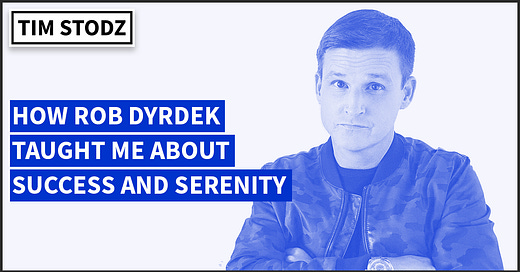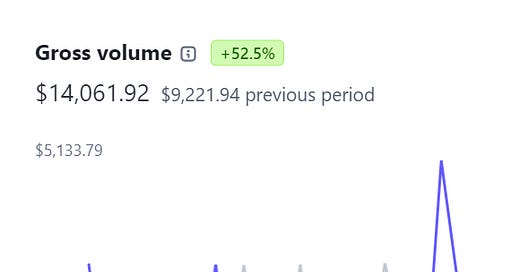
Optimizing Your Life for Success and Serenity
How much time do you waste each day?
How much of your anxiety and angst comes from the feeling of being pulled in different directions? I’ve made an observation in my life that anxiety comes from lack of focus. If I am trying to do everything, I end up doing nothing.
The question becomes, how do you eliminate choices? How can you build a life with less to think about?
I need to slow down and develop more clarity in my day to day life. My anxiety has been sky high. I’m more annoyed at strangers than I have ever been. I’m less present with my family and I’m living in fear.
This weekend, I had a four hour drive to Cincinnati. I planned to use the car ride as a time to think and clear my head.
I stumbled across a podcast episode that gave me exactly what I was looking for. Shaan and Sam from My First Million interviewed Rob Dyrdek. This interview gave me answers. After the podcast was over, I drove in silence for 3 hours, reflecting on what I had heard and thinking about how I can apply these systems to my own life.
First, Some Context on Why I Needed to Hear This
I live an extremely blessed life. I am grateful every day for my sobriety, my health, my success, and my family. I never write about my life’s challenges because I don’t want to complain.
I have everything. What do I have to complain about?
The reality is that life has been difficult.
It’s been years since I’ve felt more anxious and more uneasy with my mental and emotional well being.
I’ve always been afraid of running out of money. In some ways, making money has only heightened this fear. Now that I have wealth, losing it would make me feel like a complete failure to my wife and kid.
Covid gave me the perfect opportunity to put blinders on. “There’s nothing else I need to think about other than work”, I would tell myself. “What else am I going to do?”
Then my son was born, and I never took the blinders off.
My life is jam packed with tension. I have 24/7 phone calls with clients and employees. I’m constantly questioning myself as a Dad and a husband. Lately, I’ve been harshly judging myself in my fitness and my body.
Should I be eating more? Should I be eating less? How much money is enough? Am I successful at $10 million? Am I successful at $20 million? Is it okay to have a Milky Way? Do my partners think I’m good enough? Is my family mad at me? Are my parents upset that I don’t live in Philly? Should I be investing more because of inflation? Should I be saving more because of inflation?
This list of irrational fears goes on. It’s exhausting.
Designing the Perfect Day
In the podcast, Rob Dyrdek talks about how he has optimized his time. He built an entire customized dashboard that allows him to keep track of how much time he spends working, how much time he spends with family, how much time he spends sleeping, and how much time he spends on his health.
His system runs like a machine. I don’t want my life to be optimized to that extent, but I do want the clarity he has. He knows where all of his time, energy, and capacity is going. I want that.
This got me thinking…
“What does my perfect day look like?”
I always assumed my life was meant to be full of adrenaline and intensity. I don’t know why this is. I do everything with as much intensity as possible, but it doesn’t have to be this way.
The solution is to optimize my time.
Here goes. This is my perfect day.
4:30 AM: Wake up. Pour my coffee. Drink a big glass of water and do a quick morning stretch routine with Jules to loosen up my back pain and be present in the moment.
5:00 AM: Journal and write in my blog. I am a writer. I need to do this or else I feel incomplete. If I dedicate an hour each day to writing, I can accomplish all my writing goals with ease. I won’t put pressure on myself. I will simply write until I am out of time. If I finish something, great. If not, then tomorrow is another day.
6:00 AM: Do the work that’s annoying but important.
Answer emails.
Respond to Dhyvie in her morning report.
Send Raymond any design / programming work.
Check yesterday’s revenue numbers for Copyblogger, Stodzy, my investments, etc.
Write my “power list” to plan my day.
6:30 AM: Wake up Julian.
Change his diaper.
Feed him (if Jules is focused on her work).
Play with him on the floor and give him his tummy time.
Take full responsibility for Julian. Give my wife this time to focus on her school work, her health, and whatever she wants to do.
8:00 AM: Morning walk. Jules and I like to take a walk every morning around the neighborhood.
9:00 AM: Breakfast. Jules will cook breakfast and her and I sit down and eat a meal together at the table. No phones. No clicking on the computer. We both have great appreciation for healthy food and the spiritual power of eating.
9:30 AM: Get to work. This is where I go hard.
Close deals.
Get contracts signed.
Check in with my staff on whatever fires I have to put out that day.
Write articles and featured content for Copyblogger Pro members.
Manage the content for Sober Nation.
Do whatever needs to be done as the CEO of Stodzy Inc.
12:30 PM: Lunch
Stand up. Do some squats, mountain clumbers, pushups, light curls. Get out of my chair and move for a bit.
Eat a healthy lunch. Probably a chicken salad.
Take this time to support Jules in whatever she needs.
Are there dishes to be done?
Does the living room need picked up?
Do I need this time to unwind or think?
Can I make the coffee for the next morning?
1:30 PM: Back to Work. The second half of my work day looks different than the first half. This part of the day is dedicated to high level growth.
What operations manuals can I complete?
Are there any companies I am researching for new investments?
Is there anyone on Twitter I’d like to introduce myself to?
Do I need to go to the bank?
Do I need to go anywhere at all?
4:00 PM: Done work. Check out. Reset.
Do something nice for Jules. Take Julian.
Call my mom.
Call my dad.
Call Bryan or Tricia or Tori or David to check in.
4:30 PM: Work out / Muay Thai.
If it’s Tuesday or Friday, it’s Muay Thai training.
If it’s Monday or Wednesday, it’s lifting.
If it’s Thursday, it’s cardio.
6:45 PM: Bath time.
Give Julian his bath.
Give him his baby massage.
Read him a book.
Bedtime routine.
Asleep by 7:15.
7:15 PM: Free time.
Jules will be cooking dinner.
Can I help set the table?
Can I straighten up the couch?
Should I do none of these things and use this time for myself?
Do I need to check in with my wife?
Is there anything on her mind that I need to listen to? Is there anything on my mind that I need to run by her?
7:30 PM: Dinner.
Sit at the table with Jules.
Relax. Eat. Unwind. Talk about future plans.
Talk about our day.
Celebrate our son and our family.
8:00 PM: An hour of TV to sit together, Netflix and chill .
We both enjoy this time to keep up with shows.
9:00 PM: Go to bed.
Brush my teeth.
Read a comic.
9:30 PM: Lights out. Asleep.
ZZZZZZZZZZZZZZZZZZ
Optimizing for Success and Serenity
I’m always feeling like there’s not enough time in the day. As a way to compensate with this feeling of urgency, I rush through life without focus or intent.
There’s plenty of time. The problem is that I am wasting time and energy with worry, self centeredness, and fear.
You might be doing this too. How much time are you spending in your head? How much of your time is dedicated to planning out scenarios that will never happen or worrying about past situations that you can never go back to?
Rob Dyrdek said that he wants to “optimize his life for happiness.”
I don’t feel that way. To me, happiness is a term that marketers use to trick you into thinking that you’re not living life the way you should be. If you’re not happy, then you’re doing something wrong. It’s a lie.
Happiness has never been the goal. Being happy every second of the day sounds boring. What I want is serenity.
I want to optimize my life.
Not for happiness, but for peace.
I want freedom FROM mind. I want the ability to be in any situation and still feel the peace that only comes from establishing an understanding of yourself and your life’s intentions.
That’s the goal.
This is my mission. To optimize for success and serenity. I will achieve this state by taking control of my energy, my time and my capacity.
What does your plan look like? Let me know in the comments below.




